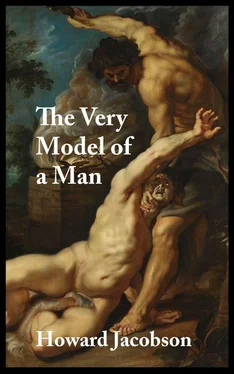I do not believe it is his beauty that inspires this heaving love in me. That imposes this heavy love on me. I am proof against beauty, and cut down the loveliest flowers in my garden in order that there should be no lingering certainties around that question. I am untouched by beauty.
Fragility cannot be it either, by the same reasoning. Nothing fragile prospers in my garden.
So what do I see when I hang over him and count the rhythmic valvular openings and closings of his body’s whimsical flirtation with life?
Can it be that I see only my own intentions? Can it be that love is nothing other than a mirror held up betimes to hate? A warning, a precautionary palpitation, a pang of remorse in advance of the event? If that is so, and my care for my brother is in direct proportion to the harm I bear him, then he has much to fear from me, because the tenderness I feel scalds my eyes, and my sorrow for him hammers at my ribs.
The other view I take is that he upsets me because he is a version of myself. An idealised version. Me unspoiled by intimate, inside acquaintance. Me as I might look to him. But observed without that coldness which always mars a younger brother’s regard. Me sweet. Me pretty. Me bathed in water scented with frangipani and narcissi.
Me wordless.
Upset is a better word for it — since we are back to words — than love. Upset more accurately denotes who is doing what to whom. It is not that I love him. He upsets me.
Let us be clear who is the instigator and who — whom — the victim. I didn’t ask him to come and lie by me in the life-expunging darkness, or sleep defencelessly on his back with his neck exposed and his pale shoulders pulsing, like a starfish on a moony beach. I never laid it down as a condition of our brotherliness that he should absent himself for the better part of his boyhood, spinning mollusc shells in preference to naming them, and thereby causing me to upset myself over him some more. He chose a fragile nature. It was given to me — an older brother’s obligation — to safeguard it.
Thus do the meek inveigle the brave and snaffle the earth.
* * *
He stops, Cain the inveigled, and raises a perfect sleeve to those seams and scissures of the face from which feeling is expected to leak. They do not need to be dried but he dries them anyway.
A dramatic gesture. He has told this story before and knows its pauses. But is there not a danger, even in godless and ingenuous Babel, that his ruse will be rumbled? That someone will say to him, ‘You affect emotion so studiedly that you must mean us to believe you are emotionless; but why would you bother to do that unless it too is a study to conceal how emotional you really are’?
Of course. ‘Drama does not at some point cease to be drama,’ he is always ready to reply. ‘You should never suppose you have seen to the bottom of a dramaturgist’s intention. Why stop at one stratagem concealing another? Why should not a stratagem hide a stratagem hide a stratagem hide a stratagem hide a stratagem…?’
A serious man talks to no one but himself. The only person Cain is keeping guessing is Cain. In truth he did not know how dry he was going to find the corners of his eyes and mouth until he dabbed them.
It is for his own benefit, not for Babel’s, that he pauses.
‘Give me a minute,’ he says.
What can you do in a minute?
You can look around a room and see that all the people you are anxious to avoid are in it.
The girl is to be expected. She would be here, hanging on to his every sorrow, even had he not been hanging on to her pigtail, in a brotherly way, for the last week.
Her father shouldn’t be here, but is. Naaman is famous for his quick, discreet visits to performances staged under his patronage. You notice him at the beginning and you notice him at the end — what you don’t expect is to notice him in between, bent backwards over his seat, just waiting to get the next joke, he would have you believe, but actually locked into a figure which gymnasts on the temple steps refer to as The Crab and would rather not perform.
Cain does not have to be acute to see that Naaman is not relaxed.
What does Naaman want?
What does Sisobk the Scryer want, mouthing to him, whenever there is a pause in the narrative, ‘D-i-d t-h-e-y g-i-v-e y-o-u m-y m-e-s-s-a-g-e?’
What does Preplen the poet want, what does he mean by bringing along a staring woman in an ill-fitting wig — presumably his wife — and five children — presumably his children, although they all look older even than their father — and sitting them in a ringleted row right under Cain the Family Desecrator’s nose?
These are rhetorical questions. Cain knows what they want. They want him. And all of a sudden he doesn’t mind.
Hence his request for a minute’s pause. He would like to accustom himself to this untoward and somewhat sickly sensation of calm.
Is that what it signifies, then, to have mould growing freely on your person — that you are permitting others to write your history for you? Is that what mildew is — the body’s abrogation of its own rule?
He doesn’t know. His minute’s up.
11. Cain Forgets a Birthday
I had begun to garden. I must have known more about my future disinheritance than I knew I knew. In a spirit of pure mockery — don’t ask me whom I was mocking: it is always everyone and no one — I had paced out an allotment, put a fence around it (a fence of which my father would have been proud, had he bothered to notice), and cleared it of the disorderly mess that grew there. When it came to design, there was little to choose (which is hardly surprising) between my father and the God who had fashioned him. They both favoured grand effects, overreached themselves, grew tired, and ended up throwing everything they had at a project and insisting that the jumble was intentional.
Life, they called it.
The principle of life that operated in my garden, prior to me, was parasitic, commensal, strangulative and noisy. Nothing had enough room or wanted the particular room it had. Nothing was calm. Nothing was patient. Nothing was generous. Nothing had any sense of decorum, or shame, or… humour.
It is no good your eyeing me whimsically. I mean what I say. Talk to any of those sensitive gardeners you boast in Babel, men who are on confidential speaking terms with their plants, and see if you can find one in possession of a single humorous anecdote told to him by a marrow. Screams are all they hear. Shrieks from the battlefield. The first great act of creation lacked drollery, and every smaller germination since has been solemn likewise. The more a thing grows, the smaller its capacity to amuse itself. The tallest animals are the saddest. The highest mountains the most contemplative. This is a truism which can be extended no less reliably to our own species. Only stunted men are funny.
So this was my test: to plant comedy in my garden. Always remembering that by comedy I mean something less frivolous than you do.
I wanted the plants I grew to be in rows and I wanted them red — not just red in flower, but red in stem, red in leaf, red in petiole and pedicel, red in bract and bud. If I could achieve a perfect row, I thought, a regimentation of height and spacing and efflorescence, accurate to the nicest measurement, I would be imposing my will on luxuriance and clamour. And if I could grow red greenery only I would be striking a blow for perverseness. Although the earth frequently did throw up crimsons and scarlets and maroons, it did so grudgingly, it seemed to me, its instinct for random plenty at war with its preference for verdancy. I wanted a contrary, cross-patch garden. I would have planted it to grow downwards, had I known how. I would have seeded it to decrease. Whenever I pondered the challenge of an entirely red tree, I wasn’t thinking of proliferation — far from it — I was thinking of the offence it would give to God.
Читать дальше











